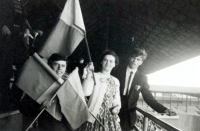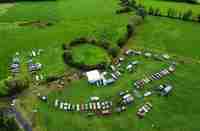 Montreal, 1976
Montreal, 1976
‘John Walker had made a number of efforts to go by me and I’d held him off. With about 250 metres to go, when John went by me…I tried to go with John and as I went with him Van Damme went by me as well. But coming up on the inside we had Wellman from West Germany…and as Wellman started to go by me on the inside, all I could think of was just running in my sleep, not getting anywhere. It was like a dream. And as we went over the finish line together all I just saw was the gold medal, the silver medal and the bronze medal disappearing’
– Eamonn Coghlan, on the 1976 Olympic 1500m final, in which he finished fourth
By the time I became aware of the great Irish athlete Eamonn Coghlan – a world class middle-distance runner during the sport’s golden era – 1976 ‘had happened’.
When I first saw Coghlan, he was speeding past some of the best athletes in the world, or narrowly losing out to them in tight finishes. There were athletics’ meets on our TV screens regularly, and the middle-distance races were gripping, with a cast of magnificent athletes battling it out week after week.
After glorying in the feats of this flying Irishman for a while, I eventually became aware of 1976. I discovered that Coghlan had finished fourth in the Olympics that year. Fourth. Worse than last. Fourth…with the last of the medals taunting you.
What was it about Eamonn Coghlan that was so compelling, so exciting?
Maybe it was his arrogance! It was and is, the odd exception aside, an un-Irish characteristic. We might have expected such self-confidence from one of the American middle-distance runners, or from the dashing New Zealander, John Walker. Irish sports stars didn’t strut on the international stage, not normally. But Coghlan appeared immune to anything resembling an inferiority complex. He seemed to be bursting with confidence; quite simply, he knew how good he was. Of course as a young athlete of great potential he had honed his craft in America (where he later became ‘King of the boards’ on the indoor circuit). Obviously some of that traditional American ‘can do’ attitude had rubbed off on him!
I liked him because of that inoffensive cockiness he had, but mostly, I liked him because he had that kick, that devastating extra gear on the final bend.
When middle-distance running ruled the world – and in the 1980s, it felt like it did – there were two types of top athletes. You had the long-striding types, who usually had great stamina. Often these athletes won from the front, or just outlasted everyone else. The second type was probably the most feared opponent, this was the athlete who was blessed with a fast finish. The challenge for them was to stay in contention until the business end of the race, to be in touch with the leaders, on the shoulder…and then strike for home with that sudden, devastating acceleration. Coghlan was the latter type; a speed merchant who could usually move up a gear when others were wilting.
It didn’t always work. If you weren’t a Seb Coe, who more often than not approached races by leading from the front, then you had signed up to a high stakes tactical battle. And that always came with risk. Where to position yourself. When to strike. Who to watch. Timing, judgement, nerve, composure, all called for. When the guy on the shoulder pounced – and won – as Coghlan often did in those bread and butter meets, it could be riveting. They were the athletes who had us out of our seats, the ones who set our pulses racing.
When the 1980 Olympics came around, we believed in Eamonn. Now he had moved from 1500m to 5000m. But we had reckoned without Miruts Yifter, the Egyptian tornado. We had reckoned without Yifter the Shifter. And we had reckoned without illness, which struck Coghlan with cruel timing. He reached the final. Our nerves were shot, even at the starting bell. Coghlan was in contention, he was in the mix. But there wasn’t enough fuel in the tank. Yifter was gone, dust rising. Two others gone too. Fourth again. Worse than last. Sickening.
‘4th in two Olympic finals’ would have been a cruel, deeply unfair legacy. Thankfully, the Dubliner was setting all sorts of records in America, where, having established himself as the master of the indoor circuit, he was worshipped by fans. He set the world indoor record for the mile, and won the prestigious annual Wanamaker Mile seven times. Every now and again, often a few days after the event, RTE got footage of Eamonn’s latest thrilling performance in the US. We watched with great pride. It was a golden era for Irish athletics. Marcus O’Sullivan, Frank O’Mara and Longford’s Ray Flynn were also competing at the highest level.
Helsinki, 1983
‘But Coghlan has Dmitriyev and the race is between the two. Dmitriyev is still in the lead, Coghlan is waiting…signals…Coghlan is going to go (commentator’s voice rises in excitement). He looks at him, he’s supremely confident! Eamonn Coghlan is going to do what he has been threatening to do all his life…he is going to win the World Championship…he runs away from the entire field…and Coghlan is the World Champion! A superb run by a supreme athlete’
– RTE commentary on closing stages of 5000m final at the1983 World Championships in Helsinki
‘The Russian has stolen a lead that may be a winning lead…Coghlan looking back for Wessinghage…and Coghlan’s closing…closing very, very quickly…now if Coghlan doesn’t panic and go too soon, he’s got a real chance…
It’s Coghlan against Dmitriyev. Will Coghlan wait? Because, if does…he’s the world indoor mile record holder…a very fast finisher. The attacking point will come off the bend…and he looks at Dmitriyev of Russia and says watch me go…and go he does!
Eamonn Coghlan on his way to a major title for the first time in his life…brilliantly run…the champion of the world!’
– David Coleman, commentating for the BBC on the 1983 World 5000m final in Helsinki
The settee in the sitting room in our house in Rooskey was meant to be for sitting on. We sat on it at the beginning of that 1983 World final, but we couldn’t sit on it once the bell went…
Coghlan was one of the favourites to win that race, but he had come unstuck on the big stage before. The reporters had the ‘Nearly Man’ headlines ready. This was the World Championship. There was huge pressure on the Irishman. He could beat everyone in the world, anywhere. But could he win on the big day? I recall him beating Steve Ovett in a great finish at a UK meet. On his day, Eamonn could take anyone. Now the world was watching…
If you’re going to enter the history books, create a legend, make an already good career great, you might as well do it in style. In Helsinki, and Rooskey, a truly great Irish sporting moment revealed itself.
Excitement raced through our bodies as we watched this extraordinary career peak for our flying Eamonn Coghlan. It looked as if ‘the Russian’ – Dmitriyev – had done a John Walker, a Yifter the Shifter. Our hearts prepared to sink. The teasing secrets of that closing stretch. Gold, silver, bronze, nothing.
But then Coghlan floated on to the shoulder of his opponent. Then he pressed the accelerator. And just before taking off, Eamonn did something unheard of in athletics. He has always insisted he wasn’t taunting his wilting rival, that it was simply his way of releasing his emotions. In that second, Coghlan knew that he had the pace, that this was his. He looked at Dmitriyev, he smiled, he clenched his fists. Arrogant! Remarkable! Unforgettable!
In Rooskey, we were on our feet, the settee long abandoned. We crouched in front of the telly, willing Coghlan across the line. He soared to victory, to the world title. Finally, a medal of great substance, an outdoor gold to add to his phenomenal indoor feats. It was an incredibly emotional moment for Coghlan. In the previous year or so, he had lost his top three influences…coaches Gerry Farnan and Jumbo Elliott, and his Dad, Bill.
‘Fight back to an even more glorious victory’
‘Before I left Ireland to go to Helsinki I went to my father’s grave to say a few prayers. I went over to Gerry’s grave and as I looked at the grave I saw the epitaph…‘Don’t quit when you are beaten – fight back to an even more glorious victory. Not only in competition, but also in life’. I plucked some grass from the grave…I stuck it into my wallet and off to Helsinki I went. And the day of that 5000m final I said to myself Gerry ‘you’re going to be with me in this race’.
‘When I went by the Russian and clenched my fists it was because I was going to do something that these people want me to do (the Irish) and that was become champion of the world…it wasn’t arrogance, it wasn’t cockiness, it wasn’t with any disrespect for the Russian. It was because having finished fourth twice, now I’m going to become champion of the world’
– Eamonn Coghlan on his 1983 World Championship win
This great Irish sporting star ran for quite a few more years (including in the 1988 Olympics; time had caught up with him, but he reached the 5000m semi-final). What joy Coghlan gave us throughout his career.
At the end of that Helsinki classic, Eamonn Coghlan crossed the line, a champion in the record books and in our hearts. The space between fourth and gold, between fourth and a kind of immortality, can be measured in fate, maybe sweat, maybe steps…definitely heart. He raised his hands to Heaven, in memory of the role models he had lost that year. He blessed himself and inhaled what he deserved, the raw glory of his greatest sporting moment. A hero then, and always.






